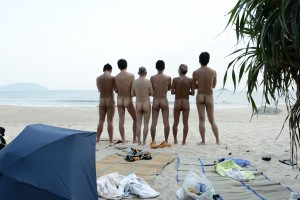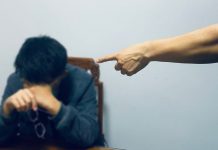Hong Kong’s home-grown nudists pursue state of nature
By Rene Lam
On a tranquil beach at the southern edge of Lantau Island, sunbathers laze around reading, taking photographs of the scenery and snoozing. They are much the same as sun-seekers you might find on any of Hong Kong’s beaches, except that trunk marks and bikini lines do not mean anything to them.
Although Hong Kong law forbids complete nudity outdoors, local nudists can still find some oases in isolated parts of Lantau, on beaches on the outlying islands off Sai Kung and a few other secret spots around Hong Kong that are usually deserted on weekdays.
Wing, who does not wish to disclose his real name, has taken time off work on this Friday afternoon to join a group of nudists who met up through social networking sites. He found out about the event after receiving an online invitation to a ‘Sunbathing Naturalist Gathering’.
Although the 39 year-old has been a nudist for ten years, this is the first time he has ever sunbathed with nudist companions. “Because I only come on weekdays, it is difficult to schedule a holiday with friends,” says Wing, “it is nice to meet new friends with the same interest.”
It took this group of ten nudists two hours to get to their destination and when they get there they strip off completely, without hesitation or awkwardness. It so happens there are some other unclothed people on the beach. They exchange smiles and go on drenching themselves in the sun.
However, when families or village people very occasionally pass by, everyone is on alert. Some quickly put on their swimsuits, some use a towel to cover their genitals. “The most important principle is to not disturb anyone… I do not want to be confrontational. After all, we are just a minority. Plus, it is prohibited by the Hong Kong law,” Wing says.

Leading today’s group is 44-year-old Zeno, who says there are usually no more than 15 participants at each gathering. These can be held either indoors or outdoors, and participants range from 18 to 50 years of age.
Zeno has been a nudist for ten years. Besides nude sunbathing, he also does nude hiking, nude Yoga and figure drawing with nudist Facebook friends. He feels delighted and relaxed to be naked in Mother Nature. “We did not wear anything when we came to this world,” he says.
For Zeno, going bare is about getting back to basics. The desire to peel off his “second-skin” is a natural one but stripping down is about more than just removing physical items of clothing. “When you are naked, you tend to be more honest and open. You would talk more about your feelings from depth of your heart,” he says.
Since he started organising nudist events on social networks 10 years ago, he has met a lot of new friends and is pleased to have found others who share an outlook that differs from that of the general public. “It feels like you’ve found the right thing in life,” says Zeno, “I am very happy that I have discovered that part of me.”
Although Zeno is not ashamed of his hobby, he still cannot be totally open about it. He uses two different accounts on social networks. The account he uses for his nudist persona uses a fake name and is not for family members and colleagues. Sometimes, Zeno feels more comfortable with strangers.
“Of course I want to have one identity only. I want the two Facebook accounts to be one. I really wish to. But I am used to what I have now,” Zeno says. “After all, [prohibiting nudity] is the law. What we do can be regarded as illegal.”

While some find it hard to openly defend their beliefs in public, there are others who cherish fighting for them.
Simon Cheung Pet-wu, in his late 40s, is the founder of local nudist society Body Art Association (BAA).The group was founded in 1995 and organised its first live body art show in 1999. Since then, it has been in the public spotlight for nudity campaigns and controversial body painting events. Cheung says the human body, “is an art form created by God.”
He was cautious about organising activities at first but eventually media coverage helped the group to establish a reputation. People began to understand their activities were not lewd. Cheung insists on taking measures to ensure the events stay that way.
Usually, the events attract more registrations from men but he always keeps the ratio of men to women at each event at 3:1. He says that if there are too few women, they will get too much attention and may feel stressed. There is always a private zone for women to get dressed and undressed.
BAA’s members come from all walks of life. There are millionaires and members of the grassroots. What satisfies Cheung the most is that when it comes to nudism, there is no difference in social status. “We are all equal, wearing the cloth given by God. It goes back to the starting point of nature,” Cheung says.
He regards clothing as necessary for warmth and some other basic functions but thinks it should not be a label. Cheung believes being a naturalist makes him attach less importance to fame and fortune.
Compared to the flora and fauna, he feels capitalist society seems almost brutal. “When we need to get back to reality, we refuse to get dressed. It is an inner struggle,” says Cheung, “the garment is too heavy to bear.”
Cheung does not see Nudism as showing off flesh. He says: “Nudists do not want to disturb others or to be disturbed. They do not want people to gaze at them.” Cheung points out that overseas, genuine nudists have given up the famous nude beaches as crowds of tourists with their long lenses have occupied them. Being under this kind of gaze goes against their desire to be free and relaxed.
In the past, BAA announced the details of their activities on their website. But this drew crowds of curious non-nudists to trail them as if they were rare safari creatures. Therefore they decided to keep their itineraries confidential.
Nonetheless, Cheung thinks it is necessary to establish a nudists’ zone in Hong Kong. Otherwise, nudists can only be “weekday nudists” who are restricted to inferior beaches with thicker sand.
Under the current legal framework, it is difficult for BAA to organise and promote their activities. They always need to negotiate for a long time when they book venues for their events.
Their website is controversial as well. It has received numerous complaints for posting explicit art photos. “Whatever I upload on Facebook, it is reported as pornography. I did not even post pictures, but drawings,” Cheung says. Yet he has never considered using a foreign server to free their website from Hong Kong law.
“We insist on using a local server. If you think I am illegal, you can sue me. I do not want to operate within the loopholes of the law,” says Cheung. The message Cheung wants to send out is that as an organisation, BAA is born and bred in Hong Kong. He says, “People always say nudism comes from the West but we clearly state that nudism is local and inborn.”
Cheung says setting up a nude beach would be mutually beneficial for nudists and the rest of society as both sides would avoid disturbing the other. But after years of requests, it is clear that any chance for a nude zone in Hong Kong is slim. He attributes this to what he feels are ridiculously strict moral standards. “People will tell you privately they are comfortable with public nudity. But when they need to give a voice, they would not touch the bottom line. They are afraid of being judged,” he says.
Sitting naked, against the one-way mirror window in his flat, Cheung muses on how difficult it can be to live a simple life in this city. So-called moral values deny humans from returning to the original way of living. People are educated to be judgmental to the extent that they will deprive the freedom for others to merely strip off.
We come into the world equal and without clothes. Perhaps we will leave it the same way too.











































